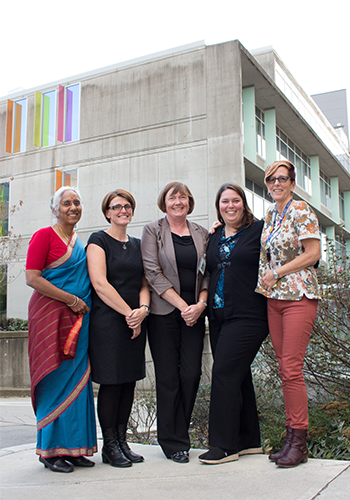UBC’s Division of Midwifery has launched a BC-wide network to foster midwifery and maternity care research collaboration across the province.
The BC Midwifery Network — a partnership between UBC Midwifery, the College of Midwives of BC, the Midwives Association of BC, Perinatal Services BC, and Midwifery departments and divisions across the province’s five regional health authorities — was formally unveiled at BC Women’s Hospital on Monday.
“This network is about building connections within the midwifery community, and sharing resources, expertise and ideas,” says Michelle Butler, who spearheaded the idea shortly after coming on board as the Director of UBC’s Midwifery Program in 2014.

Left to right: Saraswathi Vedam, Allison Campbell, Michelle Butler, Louise Aerts, and Linda Knox at the BC Midwifery Network launch at BC Women’s Hospital.
Representing the first midwifery research collaboration of its kind in B.C., the network will bring practicing midwives, researchers and educators, as well as students together to build research capacity within the profession and develop a joint research agenda focused on midwifery priorities.
During Monday’s launch event, a number of prominent leaders in the midwifery community — including Linda Knox, Department Head of Midwifery for BC Women’s Hospital and Health Care Centre and St. Paul’s Hospital, Kelly Hayes, the Vice President of the Midwives Association of BC, and Louise Aerts, Executive Director of the College of Midwives of BC — spoke about their vision for the initiative.
“This is an opportunity to bring our profession to the next level: to start asking our own questions, to start finding our own answers and to help define research priorities going forward,” says Knox, who has served as a midwife for close to three decades, and is also a Clinical Assistant Professor with UBC’s Division of Midwifery.
For many midwives in the province, including Hayes, the formation of the BC Midwifery Network signifies a new chapter, and a step in the right direction.
“There is a clear need for more midwifery research to help improve maternity care and health care. As practicing midwives, we need to have a voice and play a key role as researchers, helping to support practice and education,” says Hayes, noting the limited amount of midwifery research currently conducted by those practicing the profession.
While the BC Midwifery Network is still in its infancy, Dr. Butler hopes to see the initiative advance discussion and debate around key midwifery issues at the provincial, national and even international levels.
“Through collaboration with others in B.C. and engagement with partners from other disciplines, we’ll be able to help advance midwifery research, and better translate our findings to practice,” says Dr. Butler. “The challenge will not be finding questions, but in prioritizing those that are most important to the women of B.C.”
BC Midwifery Network membership is open to all practicing midwives, midwifery leaders, midwifery faculty and midwifery students and researchers active in the fields of midwifery, maternity care, maternal and child health, normal pregnancy and birth. For more information and to find out how you can get involved, visit the BC Midwifery Network website http://bcmidnet.midwifery.ubc.ca/